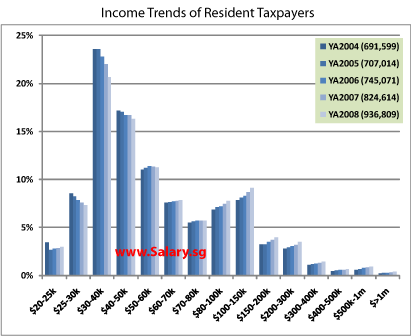9.2% of resident taxpayers made $100k to $150k in YA2008, up from 7.8% in YA2004. The increase has been gradual and consistent through the years.
In fact, all income tax brackets above the $80k mark saw a similar increase.
In contrast, it was a decreasing trend for the lower income brackets between the $25k and $50k levels.
These observations are based on our analysis of IRAS Annual Reports.

The downward trend was most pronounced in the $30-40k bracket. The proportion of resident taxpayers earning an assessable income of $30k to $40k has decreased from a high of 23.6% in YA2004 to 20.6% in YA2008.
But before we jump into the conclusion that Singaporeans are making more money, we have to note the following:
First, the data from IRAS do not differentiate between citizens and foreigners. In fact, IRAS defines a tax resident by the number days he stayed in Singapore, regardless of whether he’s a citizen, PR or foreigner IRAS treats a foreigner as a tax resident as long as he’s in Singapore for at least 183 days, putting him in the same group as citizens and PRs.
Second, we do not know how many Singapore citizens earned less than $20k. They are not part of IRAS’ statistics. There is no further breakdown other than tax residents and non-tax residents.
Third, as shown in the legend of the chart above, the number of resident taxpayers have increased dramatically from 692 thousand in YA2004 to almost a million in YA2008.
Again, we do not know the breakdown for citizens and foreigners.
What we do know is that 36% of Singapore’s population consists of foreigners, the bulk of whom are here to work, obviously. In comparison, citizens in the remaining 🙂 64% include babies, toddlers, students, NSmen, retirees, aged parents, the sick, the healthy, and of course the workers. Many are not economically active. We should thus have a smaller proportion of working adults compared to the foreigners.
I may be wrong, but I strongly think that at least 50% of our workforce are foreigners.
The increase in the number of resident taxpayers is probably due to foreigners.
With so many foreigners in our workforce, we can’t be sure if it’s citizens who are making more money. What do you think?




29 Comments
woah, another Citizen vs PR/Foreigner discussion. But I guess it’s somewhat true based on the data. Thanks Admin!
Would be more interesting if this is posted when the election dates are nearer. Love the SG govt, just displeased with the PR/foreigners policies.
admin: like you said without the exact breakdown the only thing we can do is guess.
But i would also think that sometimes what is not said is louder than what is being said.
My best guess is that if the real numbers are made known it could create a firestorm.
Otherwise the interesting question is why the propaganda machines are not blasting their horns?
Or doesn’t IRAS know the statistics?
yeah, the mainstream media should be blasting away claiming that:
– income distribution has flattened.
– those in the lower income groups have moved up the ladder into the higher income groups.
– income gap has narrowed.
– and our gini index as a result has gone down to be comparable to the developed economies.
so why aren’t they blasting their horns? you wonder.
The silence is deafening 🙂 Sorry can’t help myself.
Very interesting analysis. There seems to be some truth from the ground when they complain about competition from foreigners. It is a difficult balancing act that needs to be handled well.
Just to clarify.
Ppl who earn less then 20k a year do not have to pay tax?
yes, henry, those earning less than 20k after deducting reliefs do not have to pay tax.
i’m surprised at the drastic increase in the number of tax payers. IRAS must be very happy collecting the taxes from the foreigners, and where do these funds go? are they channeled to GIC and Temasek Holdings to fund their ‘investments’ (aka ‘risky bets’)?
aren’t there a lot more ‘mainlanders’ plus the construction workers (like those that crowd boonlay’s jurong point on weekends)?
they probably are not taxed coz they’re earning minimum wages.
I’d think the trend (34% foreigners) vs (the number of resident taxpayers have increased dramatically from 692 thousand in YA2004 to almost a million in YA2008 -> this equates to a growth of about 40+% in the number of taxable residents) sort of go hand-in hand. Thus, I still believe locals are earning more as years gone by
yes: hi, I wd believe the funds go to GIC and Temasek. I also believe they wd have exercise prudence with their investments, hence not much of risky bets.
What do you all think?
local boy: by my personal observations, the higher earning locals are now earning more while the poorer ones are earning less. it’s a stark contrast. more – because some of us are just as good as the expats. less – because there’s no minimum wage and businesses simply take advantage of manpower policies and bring in cheap labour. bear in that these cheap workers are cheap because they don’t mind poor living conditions – think cramped dorms and cheap food. they make their money and return home as much richer men. can our poorer segment compete with them? yes, but that will mean they will live like third world people, further away from our swiss living standard dream, and they have no place to return home as rich men. the graph above says nothing about this.
really think IRAS have the data. First 2 years i was making less than 20K. The year I make the amt that’s taxable, immediately hear from IRAS. So, strongly believe that they know.
local girl: i think you’re absolutely right, from socio-economic point of view =)
oh! this is most probably a fact, though. 30-50K group adds up to about 40% of population! as we very well know, current fresh graduates are earning around this range, and they will generally move to the higher group (such as 50-60, 60-70, etc.) in 3-5 years’ time.
As career growth rate differs from profession to profession, from company to company, thus, the 40% from 30-40&40-50 are then spread into the higher groups which we can clearly assume that from 30K – (100-150) K make up almost 70-80% of the population.
At least, on the bright side, we can safely assume that there’re now many young professional adults in the workforce who will be fueling the economy. We know that average income generally tells us the expected age group, Singapore may very well face aging population in around 10-15 years. This is probably the gov tries so hard to retain local talents (who will potentially earn sky-high after some years of experience) and attracting foreign talents (as well as unknowingly attracting more&more blue-collar workers)….
gosh… statistics, after all, are just numbers based on facts&assumptions to arrive at certain expected or unexpected conclusions…
your graph doesn’t show the age of the tax payers. for all you know, the imported talents (not fw) could be mostly of middle age and thus naturally command a higher salary. this will also “flatten” the distribution.
empirically, i’ve seen many foreigner employees who aren’t fresh graduates.
so, though the slopes in your graph are nice, we can’t conclude anything concrete, other than “a higher percentage are earning more”.
Just a small reminder to all those people out there who take up anything and everything for foreigner bashing—
1. Let’s not forget that foreigners contribute a lot to the good functioning of this amazing city state. U need someone to do all the jobs that are shrugged away by the locals, on pretexts as trivial as “I stay in Jurong and cannot travel to Sengkang for work!!!!”
2. Foreigners contribute to the economy by various means – buy goods here, pay VAT, pay income tax. Do u think they get any benefits out of paying these taxes when they go back home after working here in Singapore. They just contribute and leave…Think about IT.
3. If the local population could meet all the demands for the businesses here, there would be no need to call on these foreigners.
nobody is bashing foreigners. we’re merely doing our part as active and engaged citizenry “critiquing” our government’s lopsided foreign labour policies, which are exploited by businesses and foreigners to their own benefit but to the detriment of locals’ well being.
when your own country becomes more developed, you will feel likewise and do likewise when your own government only takes care of businesses and foreigners, and ignore the well being of you and your fellow countrymen.
Foreigner: I fully understand that it could be an uncomfortable subject for you. However we must be clear that this is Singaporeans disagreeing with the govt policies causing much hardships to our citizens.I also know that there are Singaporeans that lashes out to foreigners which I don’t agree with. However since you live here you should also know that most Singaporeans are usually very accommodating and friendly.
Personally I believe that we do need foreign talents to contribute to our economy and growth.
However I strongly disagree that we need uncontrolled import of foreign workers that just serves to depress wages for business.
When business says that they cannot hire workers it usually means that they cannot hire workers at the wages that they are willing to pay.
Who would blame them when there’s plenty of cheap labours available?
The other question is also why Singaporeans have become too expensive?
It’s becoming so bad that even fresh graduates are having problems competing on low wages for white collar jobs.
Long term that’s not sustainable.
For all the contributions that you listed that takes away the jobs that Singaporeans could be doing.
There is no benefit.
Having said all that I have never harbor ill will against foreigners who come here just to make a better life for themselves and their families.
However as Singaporean I need to know where the govt places Singaporeans and our future generations.
And I have the right as a citizen to exercise my right to make a choice on my govt.
Btw, I hope someone is calling our Law Minister Shanmugam this morning.
MM Lee –
‘Trains are overcrowded with foreigners, buses too, property prices have gone up because foreigners with permanent residence are buying into the market.’
A disclaimer before I start. My job is not exactly secure that I am saying this from my ivory tower. You could say I am personally affected by the depressing wage situation.
My point is what’s wrong with business depressing wages? It simply means that people with skills are in abundance. If not in Singapore, another country X. The evolutionary response is to either move up the value chain to take up new skills with higher wages or to a different value chain where skills sought after are in low supply.
Kevin: that’s because it assumes everybody will be able to move up the value chain.
Which is a false premise.
No amount of upgrading and retraining will enable you to compete with cheaper and unlimited labour if there are no control in place.
That’s why when older white collar workers get retrenched they don’t have any other choice but to drive taxis.
That’s hardly moving up the value chain.
What about the lower blue collar workers replaced by cheap unskilled workers from abroad?
Why are they unable to find living wage work?
Wage arbitrage is good for business but it does not move people up the value chain.
Do we sell Singapore based on just the fact that we have abundant, cheap and disposable workforce?
and what’s wrong with locals asking for better differentiation?
the problem is that our government makes it too attractive for foreigners – dishing out PR and work permits – to the point that some are laughing at us and some even have the cheek to chastise us in public media.
other great economies without big populations and natural resources such as denmark and switzerland manage to do much better than to blindly import foreign workers.
being the highest paid in the universe, our ministers themselves should be cheaper, better and faster in tackling issues. you said what’s wrong with business depressing wages, i say what’s wrong with the electorate demanding our ministers to perform better for their worldly salaries.
We sell Singapore as a business hub, to be able to attract talent from all over and to be able to let go of them in bad times. This is Singapore’s unfortunate Wall-street reality.
Say we tighten immigration policy, there will not be enough labour to support business operations and given that we are so dependent on foreign investment, foreign investment will move out of Singapore to another country, which in turn reduces demand for labour.
Nothing wrong to ask for better differentiation, except that we need to be careful what we ask for and be prepared for possible consequences of eventual job losses when the economy shrinks.
Kevin: and I would agree with you that big corporations call the shots. As I also said before we need and always welcome foreign talents that adds competitive edge and knowledge workforce.
But we don’t need my waitresses and cashiers working below Singaporean living wages because living costs are driven up by the same people coming in to replace Singaporean.
Just as we don’t need importing foreign workers competing for jobs that our capable and young workforce are able to do.
Just because we need to control the floodgate doesn’t mean that we will not have enough labour to support business.
Singapore has other factors to attract businesses besides dirt cheap wages.
Otherwise everyone will be moving to Indonesia or Africa to do business.
Lastly let’s examine the problem that Singaporeans are expensive.
We can’t blame Singaporeans for this big mess up, can we?
>We can’t blame Singaporeans for this big mess up, can we?
well, our elected politicians have been blaming us and calling us “lesser mortals”, “culprits”, “sheep” and most recently labelling us “daft”.
we will show them how daft we are at the ballot box.
Hi middleclass, I truly second what you had said. LOCAL, the Singaporeans are definitely not to be blamed for this situation.
Please let me know that why has it not been possible for Singapore to have a point based immigration system, just like most of the developed nations have it? The government has all the list of jobs that are not being filled up with the local population. Keep a quota on the number of people who can be brought in to contribute to the contry’s growth. England has faced a similar problem because of opening upto the EU, where it was flooded by east europeans who were willing to work for a pittance in its service industry. But they have taken note of it and are working towards fixing a quota system.
Secondly, does Singapore have a minimum wage program in force? If the worker is willing is to work at a salary lower than what is stipulated by the government, he shud be taken to task along with the employer. But then, I think most of the businesses here are looking to increase their operating margins at the cost of not employing their own countrymen. Are big business houses also doing that?
Last but not the least, in this global scenario- the individual has to constantly upgrade his skills to keep up with the job market. Gone are those days when one could keep doing the same quality of job for a long time.
excellent suggestions! if it’s even possible, i would like to invite you to run our manpower ministry. the pay is about $2 million a year. and i’m sure you would do a much better job than our overpaid and underperforming ministers.
Foreigner: I’m glad you do see that having a healthy system is beneficial to both you and me.
Unfortunately I do not even pretend to know the answers to our problems.
My humble opinion is that as with anything else moderation and control must be in place to keep a balance.
We have many believers in ruthless drive for efficiencies and unfettered greed of capitalism almost to the point of being their religion.
I don’t believe that the end justify the means especially when we are talking about human beings here.
We must strive for a system that’s good for the society and not just good for the privileged few.
My apologies for going off tangent on a rant.
I do find your suggestions very meaningful.
I would be interested to hear what other wiser people have to say about our solution for Singapore.
It is always a pleasure for me to come to the internet and learn something new.
Thanks for the invite, Local. Must say the offer is quite tempting!!
But unfortunately, if the right people were doing the right jobs then the world would have been a better place already. Truly yours.
I’m another foreigner here.
I’d like to say that the majority of Singaporeans are accommodating and law abiding and it must certainly have contributed to the growth of Singapore to where it is today.
I’m not a tax or policy expert. I sincerely hope there will be more jobs to go around matching the skill sets that are present in Singapore.
Best wishes for all
Is there a part of the data that is planned to be misleading? No distinction between foreigners and locals, surely with more than double the increase in foreigners, the general outlook would be upward increase in weath.
Why is the population in Singpaore keeps on falling despite all these measures by the government, had it not been the influx of immigrants?
Why do the Government offer scholarships to young ones only to BOND THEM for 6 years (marriage years) in Singapore?
Compare these policy and facts to so called “Rival” – Hong Kong
The Smarter One will know why